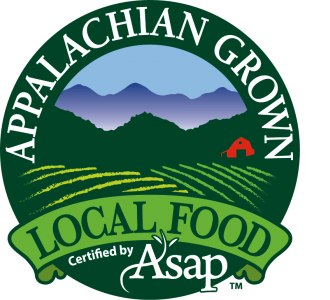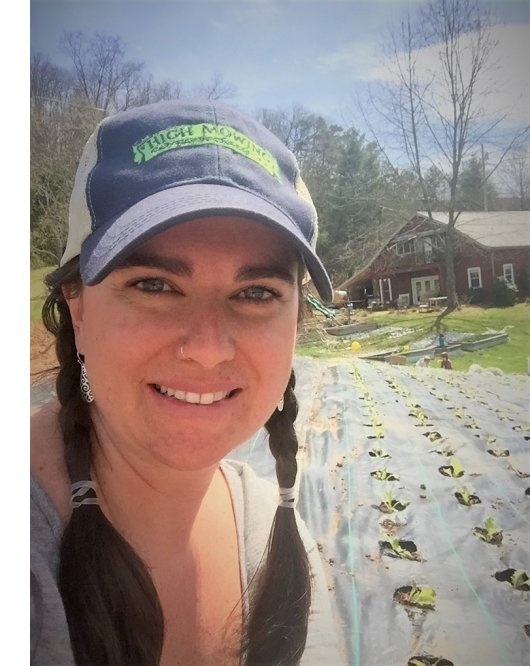|
|
|
D e c e m b e r 2 0 1 9 a s a p c o n n e c t i o n s . o r g
|
| |
|
|

Happy holidays from ASAP! We gather for a staff retreat each December to reflect on the successes and challenges of the past year and to make plans for the new one. Our work is so often wide-ranging, and this is a chance for us to see how it intersects and ripples through our community. Just a few of the programs we're excited about from the past year are:
- Doubling SNAP. This new program enabled us to match dollars spent by SNAP users at Asheville City Market, doubling the amount they could spend with farms and other vendors.
- CSA education. We published a new CSA guide (look for it again in January 2020), offered two CSA fairs (in Asheville and Boone), and supported area businesses in implementing workplace CSAs for their employees, including a successful pilot with the City of Asheville.
- Expanding Farm to Preschool resources. Our Growing Minds program made inroads in incorporating farm to preschool training into community college Early Care and Education programs across North Carolina. Look for an updated Farm to Preschool toolkit in 2020.
- Supporting farmers market managers. We gathered 35 market managers for a leadership and training summit at the Business of Farming Conference, created promotional materials and resources, offered mini grants for wellness programming at markets, and helped develop market action plans.
- Telling local food and farm stories. Our Growing Local radio broadcast featured 50 new food and farm stories in 2019.
We couldn't accomplish what we do without your continued support! Make your contribution to ASAP today to help local farms thrive, link farmers to supporters, and build healthy communities through connections to local food. Thank you!
|
|
 |
Local Food and Farm Gifts
|
Still need a last-minute gift or two? Look no further!
For more ideas, explore local artisan makers, farmers markets, farm experiences, and more in ASAP's online Local Food Guide.
|
|
 |
Do you have your 2020 calendar yet? ASAP's 2020 calendar features Appalachian Grown food and farms for each month of the year, captured by the winners of our photography contest. The cover image of swiss chard at the North Asheville Tailgate Market was captured by Shay Amber. Look for calendars (they're free!) at your local farmers market or stop by the ASAP office, Monday through Friday, 9 a.m. to 5 p.m.
|
|
 |
Workshops Announced for Business of Farming Conference
|
Discover what workshops—covering topics like business planning, branding and marketing, and market outlets—will be offered at the 2020 Business of Farming Conference and start planning which you'd like to attend. The conference features the return of workshops like Selling to Restaurants, Navigating Farm Programs, Resources, and Support, and Crafting Your Farm Story, as well as new titles like Diversifying with Value-Added Products and Food Safety and Liability for Direct Markets. Find full descriptions and register online.
ASAP’s Business of Farming Conference will take place Saturday, Feb. 22, at the AB Tech Conference Center in Asheville, NC. Early-bird rates are available through Feb. 1, and discounts are available for farm partners registering together.
|
|
 |
Winter Children's Booklist from Growing Minds
|
Our Growing Minds Farm to School team has assembled a list of a few of their favorite winter children's books—great for holiday gift giving or curling up by the fire on snow days. Find these and more food and farm focused children's literature at growing-minds.org.
|
|
 |
 Have you updated your Local Food Guide yet? We update this guide annually so that the community stays up to date on where the can find and connect with Appalachian Grown food and farms. As the growing season slows down for the winter, staff and volunteers will call more than 1,400 farms, tailgate markets, and businesses over the next two months to ensure we have complete and current information for the printed guide, which comes out in April, and online at appalachiangrown.org. Update your listing today or volunteer to help in our phone-a-thon! Have questions about how to manage your listing? You can call the ASAP office at 828-236-1282. Have you updated your Local Food Guide yet? We update this guide annually so that the community stays up to date on where the can find and connect with Appalachian Grown food and farms. As the growing season slows down for the winter, staff and volunteers will call more than 1,400 farms, tailgate markets, and businesses over the next two months to ensure we have complete and current information for the printed guide, which comes out in April, and online at appalachiangrown.org. Update your listing today or volunteer to help in our phone-a-thon! Have questions about how to manage your listing? You can call the ASAP office at 828-236-1282.
|
|
 |
PHOTOGRAPHER SPOTLIGHT |
|
Our December photo of the month comes from Bill Arrington, who raises Scottish Highland cattle in the steep mountains of Mitchell County. Stay warm out there!
|
|
|
|
 FACES OF LOCAL FACES OF LOCAL |
| |  ASAP likes to share the stories of people who help us fulfill our mission. This month we talk with farmer Stacey Thompson of Our Fiddlehead Farm in Haywood County, who will be presenting at the Business of Farming Conference on Feb. 22. ASAP likes to share the stories of people who help us fulfill our mission. This month we talk with farmer Stacey Thompson of Our Fiddlehead Farm in Haywood County, who will be presenting at the Business of Farming Conference on Feb. 22.
Why do you attend Business of Farming each year?
The networking and camaraderie of the Business of Farming Conference is so valuable. Farmers tend to be homebodies because we have to work, so we don’t get to talk to each other. ASAP also does a good job of having a pulse on trends in farming. I always come away with a nugget of inspiration or an idea that’s new and innovative. The workshops are small-farm-centric, not scaled to industrial or one-crop farms, so the content is applicable and realistic, not theoretical.
You're presenting on a panel of CSA farmers. How has your CSA experience evolved over time?
This is our tenth year offering our CSA. It’s evolved organically as our family has. We used to attend midweek and weekend markets. As we added small children (the fiddleheads) to our clan, the midweek market became too much. That got me thinking about how we could adapt and change, and what we could do with midweek harvests. We landed on a CSA, which with one child I could deliver during nap time. Then we added more children, with different nap times, and moved to onsite pickup. We started with traditional model of pay up front, one size, you get what you get. Now we offer pay-as-you-go. That opened it up to SNAP/EBT families. We got to a point where our waitlist was as high as families we were serving. That led us to farm partnerships and a multi-farm model. We’ve been able to be very specific and strategic about what we’re doing, which has helped me have more confidence as we’ve changed.
What are some business concerns that you (or other farmers) have that are specific to farming?
There are a lot! As a small farming business, our biggest concern is reliable labor. Also, diversification of crops. Right now, hemp is really big. If you put all your eggs in that basket and at some point it reaches its plateau, will it still be worth it? There is a balance that shifts so much. Mandates and regulations, particularly federal and state. So often in reading them they sound like they contradict each other. Investors and loans. You can go into the bank with a best business plan, and they can say no. My business partner, the weather, is completely unpredictable and undependable.
How did you get into farming?
I spent all my summers on my family’s farm in Iowa. I gathered 30 dozen eggs a day; we milked in the morning and the afternoon, and I swore I would never be a farmer. But I went to Clemson and studied animal science and sociology. Farming allows me to do both. My husband and I both had real world jobs, but I wanted to get out of rat race and wanted to work from home. We were going to the farmers market with excess produce from our market garden. That let me know this is viable. John Michael still works for a landscape supply company in Asheville because health insurance is a real concern. He helps with farm too, but I’m the main fixture. As we added children, all of that’s evolved.
Is the winter season a more restful time for you, or just as busy as other seasons?
Different is a good word. It’s more restful physically, but amped up mentally, emotionally, and logistically. We’re planning, doing financial projections for next year. Being a seasonal business, we have to keep in contact with our customers. There’s no guarantee we will see them in March unless I post to Instagram regularly or send monthly newsletters of what’s going on on the farm. But inherently winter is more restful. We get more sleep. We read seed catalogs by the wood stove.
Find out more about the Business of Farming Conference at asapconnections.org.
|
|
|
|
 TAILGATE MARKET ROAD TRIP TAILGATE MARKET ROAD TRIP |
| Jackson and Macon Counties
|
| Winter is a time of travel—be it visiting family and friends or even embarking on a retreat from work. However, did you know winter is also a great time to stop at farmers markets? Whether you're picking up fresh produce for a meal, seeking out a souvenir, or looking for a family friendly activity, farmers markets offer a great way to connect wherever you travel. Join us for our Road Trip series, as we explore farmers markets across the Appalachian Grown region.
This month, we head to a few of the westernmost counties of North Carolina: Macon and Jackson. These areas are chock full of history, culture and scenic views. They also have two fantastic farmers markets! First up is Franklin Farmers Tailgate Market, located in downtown Franklin. This market is open on Saturdays year round. Market hours are slightly shorter in the winter season, from 10 a.m. to noon. This market prides itself in remaining an agriculture-based market. This time of year you can find fantastic winter produce, such as potatoes, microgreens, squash, turnips, and bok choy. The market also offers handmade products and gifts, like soap! While you’re there, make sure to stop in at Franklin’s famous museums to learn more about the town.
The Jackson County Winter Farmers Market is another great option if you are travelling through this region. This market is located in Sylva, a short drive northeast northeast from Franklin. The market runs 10 a.m. to 1 p.m. on Saturdays and will stay outdoors until the end of the year. In February, the market moves inside The Community Table. This market offers a wide range of food and goods, including apples, pumpkins, honey, chicken, duck, and mushrooms. The market accepts SNAP, making the market more accessible for everyone. After you are finished shopping at the market, head over to Guadalupe Cafe for lunch, which sources from many of the same farms. They offer delicious options made using food sourced from many of the farmers at the market!
For more food and farmers market in the region, visit appalachiangrown.org.
|
|
|
|
 RECIPE OF THE MONTH RECIPE OF THE MONTH |
| | 
Are collard greens part of your New Year's Day tradition? Some consider these (or other dark, leafy greens) to represent good financial luck in the coming year, along with black-eyed peas, which symbolize prosperity. Whether you buy into the superstition on not, you can enjoy local collard greens (plus local bacon, honey, hot sauce, and onions) with this recipe.
Ingredients
- 1/4 pound bacon ends
- 1 large onions, diced
- 2 bunches of collard greens, washed, stems removed, and torn into large pieces
- 1 tablespoon honey
- 2 tablespoons red wine vinegar
- 1/2 teaspoon hot sauce
- 1/2 teaspoon salt
- red pepper flakes (optional)
Instructions
- In a wide, large pot over medium heat, render the fat from the bacon ends. Add onion and sauté until translucent. Add greens and sauté until beginning to wilt. Add water to barely cover the greens. Reduce heat, place a lid on the pot, and simmer until greens are very tender, stirring occasionally, about an hour.
- Whisk together honey, vinegar, and hot sauce. When the greens have reached your desired tenderness, stir in the mixture. Season to taste with salt and red pepper flakes.
|
|
|
|
 MEDIA HIGHLIGHTS MEDIA HIGHLIGHTS |
| |
|
|
 ASAP’s Growing Local audio series runs on WNCW on Monday mornings during Morning Edition at 8:45 am. Here are a few recent episodes: ASAP’s Growing Local audio series runs on WNCW on Monday mornings during Morning Edition at 8:45 am. Here are a few recent episodes:
You can listen to all Growing Local episodes on SoundCloud, iTunes, or on ASAP's website.
|
|
 |
|
|
|
| | |
ASAP's mission is to help local farms thrive, link farmers to markets and supporters, and build healthy communities through connections to local food.
|
|
|
|
|
|
|
|
|
|
|